Special Report
Countries That Hate America the Most

Published:
Last Updated:

Just 1% of Russians approve of U.S. President Barack Obama’s administration — the worst U.S. approval rating of countries in the world and the lowest approval of U.S. leadership in any country in the past decade. Unlike Russia, many countries have a positive view of the United States, according to the most recent Gallup poll. In fact, compared to other world powers, including Russia, the United States is generally perceived more favorably. However, the populations of some countries seem to truly hate America.
24/7 Wall St. reviewed “Rating World Leaders: 2016 What People Worldwide Think of the U.S., China, Russia, the EU and Germany,” a report based on polls conducted by polling and analytics firm Gallup. In Russia, 89% of the population disapproves of U.S. leadership. A number of former Soviet states, as well as several Middle Eastern nations, also have very high U.S. disapproval ratings. Iran rounds out the list, with 51% of residents reporting a negative view of U.S. leadership. In all, there are 15 countries where a majority of the population disapproves of the Obama administration.
[in-text-ad]
In an interview with 24/7 Wall St. Ambassador Stuart Holliday, president and CEO of the Meridian International Center said these ratings “reflect legitimate opinions that people have whether they’ve been shaped by culture, history, or the news.”
Click here to see the countries that hate America the most.
Although U.S.-Russia relations have improved considerably since the Cold War, they began to deteriorate after President Vladimir Putin took power. Holliday explained that Putin has been largely responsible for positioning the United States as opposing Russia and stoking the negative sentiment.
In the case of United States and Russia, the perception of each country’s population of one another seems to mirror U.S.-Russia relations. However, this seems to be the exception. In other countries, the populations seem to maintain unfavorable views towards U.S. leadership despite normal to strong ties between the two governments.
A majority of the 15 nations are formal allies of the United States. Four of the 15 — Afghanistan, Iraq, Egypt, and Pakistan — are among the top recipients of U.S. foreign assistance. As Holliday explained, governments typically form relationships around policy positions. The views of the people, by contrast, “might be formed on where they might want to migrate to, to live, whether they admire the education system or the economic system.”
Not only are a population’s’ views often quite different from that of a government, but because of the varied possible interpretations of the survey question and because of the differing amounts of information available in each country, disapproval ratings can have different meanings in each country. Nowhere is this variance more apparent than in the United States itself, where 61% of residents disapprove of U.S. leadership, worse than a few of the countries who hate America the most.
To identify the countries that hate America the most, 24/7 Wall St. reviewed “Rating World Leaders: 2016 What People Worldwide Think of the U.S., China, Russia, the EU and Germany,” a report published in October 2016 through a partnership between nonprofit global leadership organization The Meridian International Center and polling company Gallup. Gallup conducted face-to-face and telephone interviews with approximately 1,000 adults, 15 years and older, in 133 countries in 2015. Survey participants were asked whether they approve or disapprove of U.S., Chinese, Russian, EU, and German leadership. Each country on this list was ranked on the percentage of residents who disapprove of U.S. leadership. GDP per capita (PPP) and unemployment rates in each country are for 2015 and came from the International Monetary Fund. Life expectancy at birth came from the World Bank.
These are the countries that hate America.
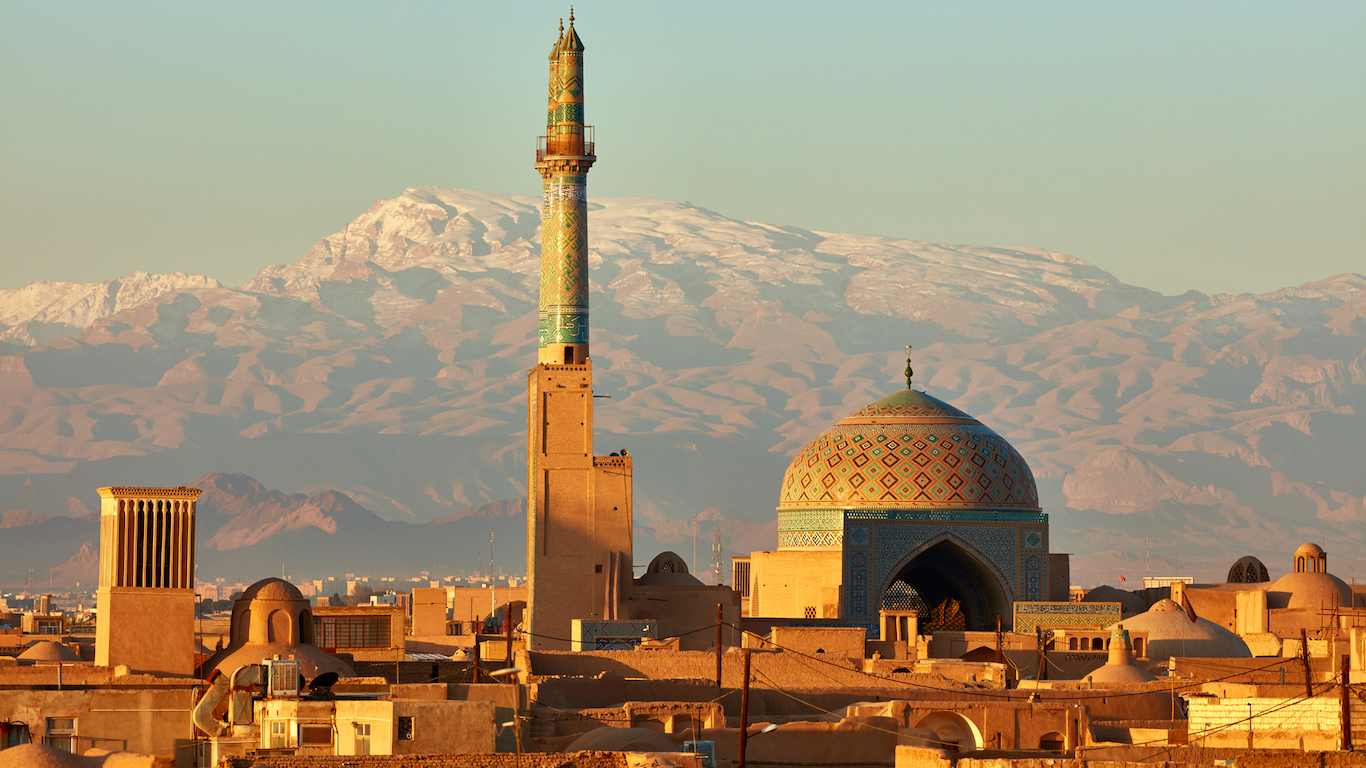
15. Iran
> Disapproval rating: 51.0%
> GDP per capita: $5,443
> Unemployment rate: 12.8%
> Life expectancy: 75.4 years
Iran is one of only 15 countries where a majority of residents disapprove of the Obama administration. Despite the large disapproval rating, the perception of U.S. leadership among Iranians has improved considerably since 2011. Specifically, Iran’s approval of the United States rose significantly in 2015 compared to 2014 after the nuclear deal with world powers was reached. Though intended to cripple Iran’s ability to develop nuclear weapons, the deal also promised the lifting of nuclear-related economic sanctions. Sanctions were officially lifted at the beginning of this year after Iran complied with its part of the deal.
[in-text-ad]

14. Tunisia
> Disapproval rating: 53.0%
> GDP per capita: $3,873
> Unemployment rate: 13.3%
> Life expectancy: 74.1 years
Major political protests in Tunisia starting in 2010 led to President Zine El Abidine Ben Ali going into exile in 2011 and unprecedented peaceful democratic elections in 2014. This was the first free and open democratic election since Tunisia gained independence in 1956. Since the 2010 protests, the United States has provided the country with more than $80 million in funding for democratic initiatives. While American support of the new administration has fostered good relations with the Tunisian government, the sentiment does not appear to be shared by all. More than half of Tunisia residents disapprove of U.S. leadership, and in 2012 outrage over a film lampooning the Prophet Mohammed led to an attack on the U.S. embassy in Tunisia. The country’s government officially condemned the attack.

13. Kyrgyzstan
> Disapproval rating: 54.0%
> GDP per capita: $1,103
> Unemployment rate: 8.1%
> Life expectancy: 70.4 years
Kyrgyzstan is one of several former Soviet Union member states with among the highest U.S. disapproval ratings. Because of Russia’s extremely poor perception of the United States, countries sympathetic with Russia often reflect similar sentiments. Kyrgyzstan’s approval of Russian leadership, at 85%, is third highest worldwide.
Manas airport in Bishkek operated as a U.S. air base for over 12 years in Kyrgyzstan. During the Afghanistan War, the base was used by almost all U.S. military personnel entering the region. The Kyrgyzstan government did not renew its contract with the U.S. military and closed the base in 2014. President Almazbek Atambayev claimed the base had a destabilizing effect on the region, and some have pointed to the base’s closure as a sign of the country’s strengthening ties with Russia.

12. Serbia
> Disapproval rating: 56.0%
> GDP per capita: $13,699
> Unemployment rate: 18.5%
> Life expectancy: 75.5 years
Less than two decades after a war with the United States, 56% of Serbians disapprove of U.S. leadership. The Kosovo War began in 1998 as conflict between Serbian forces in the region and the largely Albanian Kosovo Liberation Army erupted. At the time, Kosovo was a contested region constituting 15% of Serbia and the counterinsurgency measures used against the Albanian minority community were severe.
[in-text-ad]
With escalating violence, the United States and NATO forces got involved. Then President Bill Clinton authorized troop deployments to Yugoslavia in 1998, and the U.S. took part in a NATO-led bombing campaign of the region that resulted in the deaths of at least 200 Serbian civilians. When the United States recognized Kosovo’s declaration of independence in 2008, widespread protests broke out and the U.S. embassy in Serbia was attacked. While only 16% of Serbians approve of U.S. leadership, 85% of the Kosovo population does, the highest of any country.
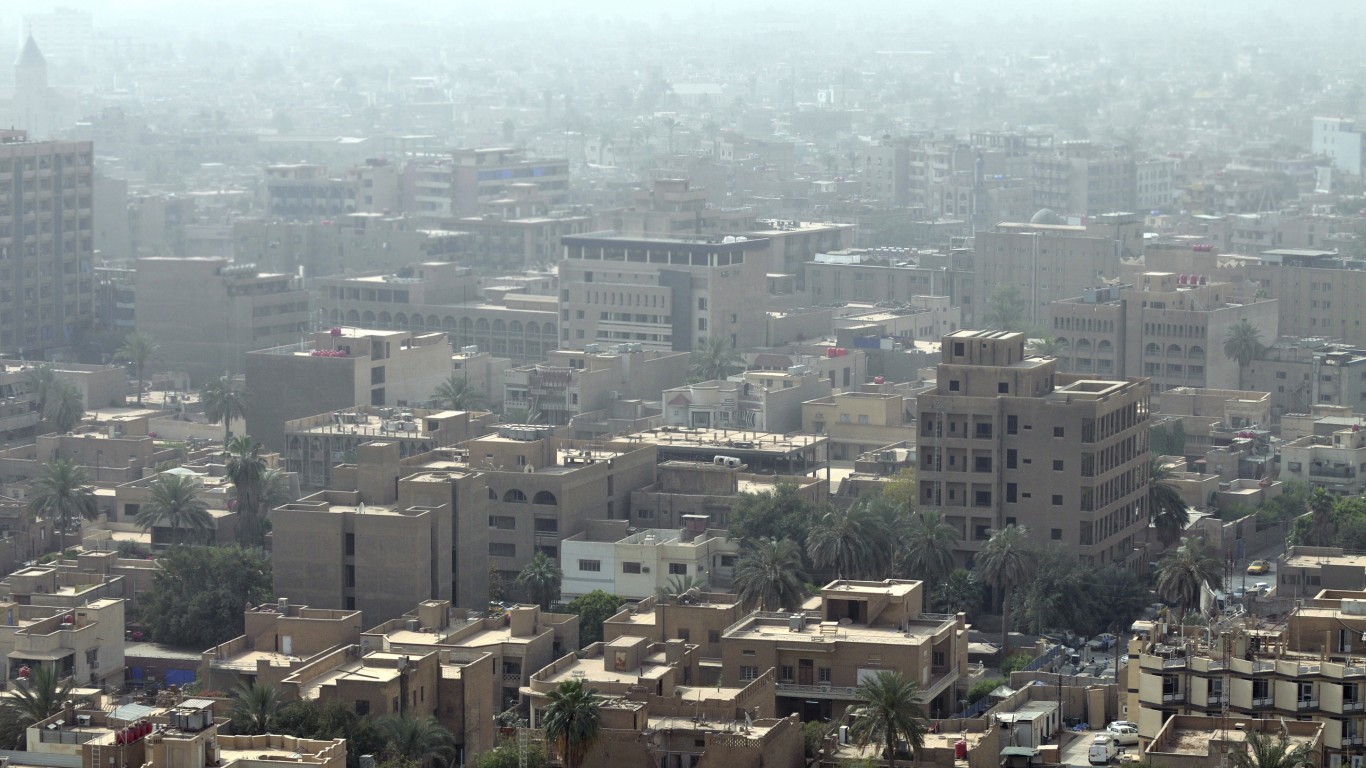
11. Iraq
> Disapproval rating: 57.0%
> GDP per capita: $15,186
> Unemployment rate: N/A
> Life expectancy: 69.4 years
One reason for the anti-American sentiment throughout the Middle East and around the world is the 2003 U.S. invasion of Iraq. Today, 57% of Iraqi citizens disapprove of U.S. leadership, a larger share than in all but 10 other countries. Iraq, however, is no different than most nations — American approval rating has increased worldwide with the inauguration of Obama in 2009. Similarly, Iraqis’ current approval rating, although low, is an improvement from eight years ago, when 76% of Iraqi citizens disapproved of the United States under then President George W. Bush.
Still, U.S. leadership approval has waned in Iraq over the last year. Public opinion may have been sullied by the rise of Daesh, which some experts believe was facilitated by the U.S. withdrawal from the region.
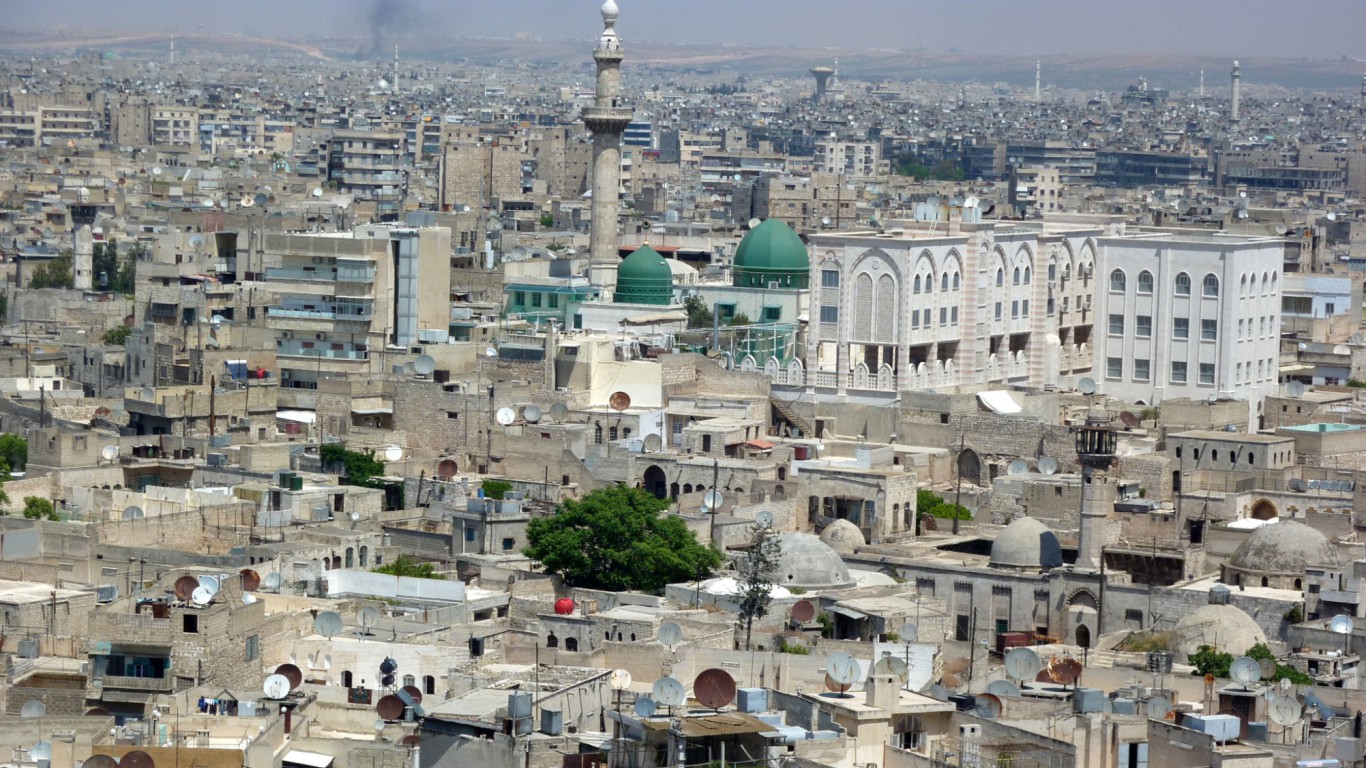
10. Syria
> Disapproval rating: 59.0%
> GDP per capita: N/A
> Unemployment rate: N/A
> Life expectancy: 70.1 years
A few of the countries with the highest U.S. disapproval ratings are new to this list, but not Syria. Syrian perception of the United States has been persistently poor for years. Even so, recent events have not improved approval of U.S. leadership in the Middle Eastern nation.
Some Syrians likely disapprove of the U.S. support — or insufficient support or lack of involvement in the country’s civil war and the ongoing refugee crisis. With extremist groups such as Daesh operating in the region, many Syrians also likely have first-hand experience of U.S. military operations against the group. For example, the United States and several Arab nations launched airstrikes in September 2014 in Aleppo, Raqqa, and other areas in the region. Based on reports from the Pentagon, the numerous U.S. airstrikes targeting Daesh in recent years have resulted in hundreds of civilian casualties. According to nonprofit transparency project Airwars, over 1,000 civilians have been killed in U.S. attacks in the region.

9. Austria
> Disapproval rating: 60.0%
> GDP per capita: $46,986
> Unemployment rate: 5.7%
> Life expectancy: 81.3 years
While 37% of Austrians disapproved of U.S. leadership in 2011, today 60% of surveyed Austrians disapprove of the Obama administration. The change in sentiment among Austrian citizens may be due to the shift in the country’s domestic politics. In the first round of the most recent presidential election, Austria elected what would be the first far-right head-of-government in Europe since the end of World War II. Obama has spoken publicly against Austria and Europe’s rightward shift. In a speech delivered the day after Austria’s election, Obama warned against the “creeping emergence of the kind of politics that the European project was founded to reject,” calling it a “mentality that tries to blame our problems on the other.” The cultural shift in Austria may be one reason for the growing disapproval of U.S. leadership.
[in-text-ad]

8. Egypt
> Disapproval rating: 62.0%
> GDP per capita: $11,803
> Unemployment rate: 12.9%
> Life expectancy: 71.1 years
Many of the countries that dislike the United States receive substantial U.S. assistance, which only reveals the often stark differences between the relationships of foreign governments and the sentiments of a country’s population. The U.S. has provided approximately $1.3 billion in military aid to Egypt each year since 1987. In 2011, demonstrations in Tahrir Square started a string of popular uprisings known as the Arab Spring. After Egypt’s first democratically elected president, Mohamed Morsi, was toppled in 2013, the U.S. withdrew aid. The current leader, Abdel Fattah el-Sisi, has been accused of implementing a police state. In a move that has been interpreted as condoning the new regime, military aid to Egypt was restored this April.
Approval of U.S. leadership among Egyptians dropped sharply in 2015. The country was one of only seven where approval fell by 10 percentage points or more from 2014.
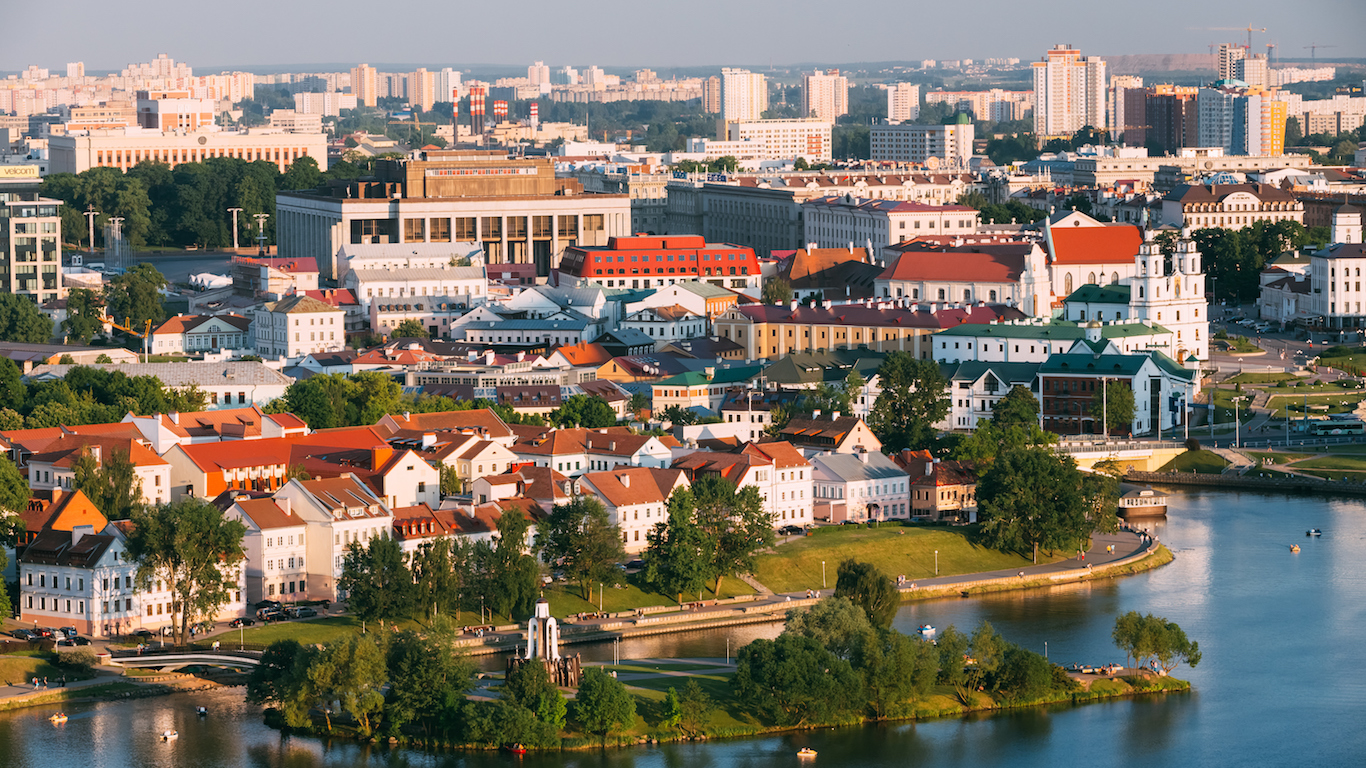
7. Belarus
> Disapproval rating: 67.0%
> GDP per capita: $17,715
> Unemployment rate: 1.5%
> Life expectancy: 73.0 years
In 1994 President Clinton became the first U.S. president to visit Belarus, but relationships have deteriorated since. In 2004, Congress passed the Belarus Democracy Act, authorizing funding for political opposition parties and organizations that promote democracy and human rights in the country. Due to concerns over human rights violations and the undermining of democracy, the United States imposed sanctions against Belarus in 2006 and extended them earlier this year. Ideological differences between the two countries have defined political US-Belarus relations, and may also be reflected by the Belarus population. The most recent survey found that 67% of Belarusians disapprove of U.S. leadership, among the worst U.S. ratings of any country.
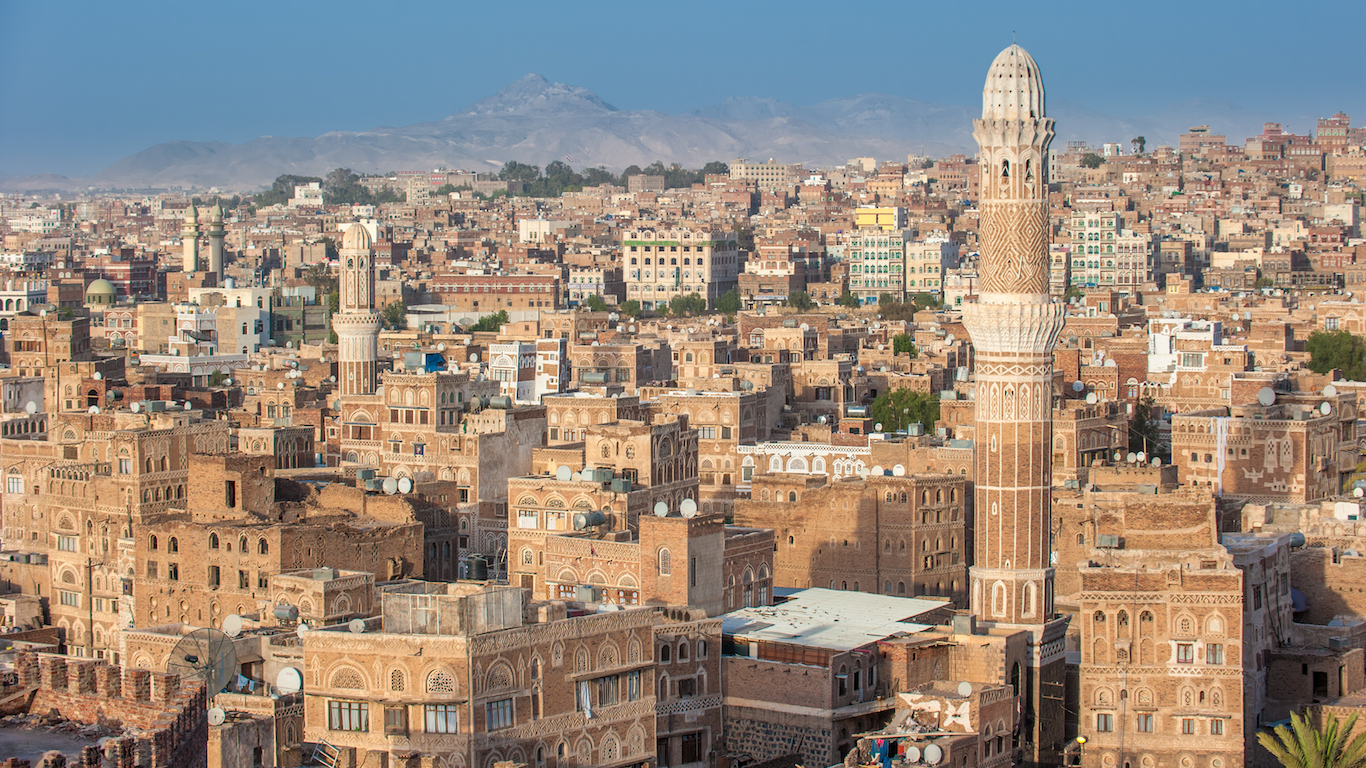
6. Yemen
> Disapproval rating: 69.0%
> GDP per capita: $2,676
> Unemployment rate: N/A
> Life expectancy: 63.8 years
Thousands have been killed in Yemen’s civil war, which began in 2015. Thus far, airstrikes against rebels by the Saudi-led multinational coalition, which supports Yemeni President Abdrabbuh Mansour, have caused the majority of deaths. Saudi Arabia has long been a close ally of the United States, which has provided billions of dollars in military equipment to the country. The use of weapons originating from the United States in Yemen has very likely fueled the high U.S. disapproval.
[in-text-ad]
The U.S. military took direct and unprecedented action this October, when Navy destroyer USS Nitze, after an attack on the USS Mason, responded by bombing Houthi-controlled territory in Yemen.
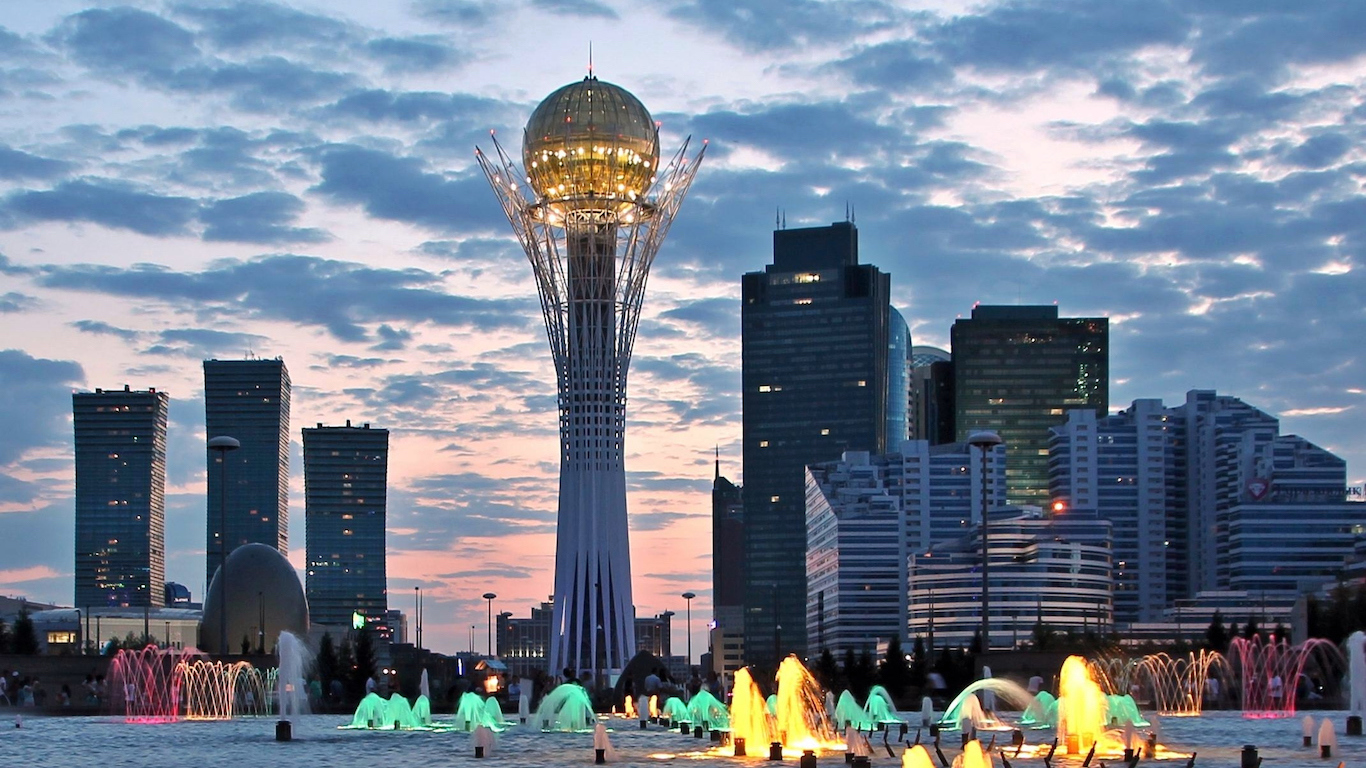
5. Kazakhstan
> Disapproval rating: 70.0%
> GDP per capita: $25,912
> Unemployment rate: 5.0%
> Life expectancy: 71.6 years
Since the United States recognized Kazakhstan’s independence after the collapse of the Soviet Union in 1991 — the first country to do so — the two governments have been close allies. As in a number of other former Soviet states, however, Kazakhstanis do not feel as close to the United States as their government does and report one of the worst U.S. disapproval ratings in the world. For many Kazakh residents, sympathizing with Russia and approving of U.S. leadership may be mutually exclusive.
Most countries with strong dislike for the United States are struggling economically or with violent conflict — regardless of whether or not the U.S. is directly involved. Kazakhstan is no exception. The country, which is heavily dependent on its oil industry, has been slammed by falling oil prices in recent years, which hit the economy hard enough to cause social unrest.
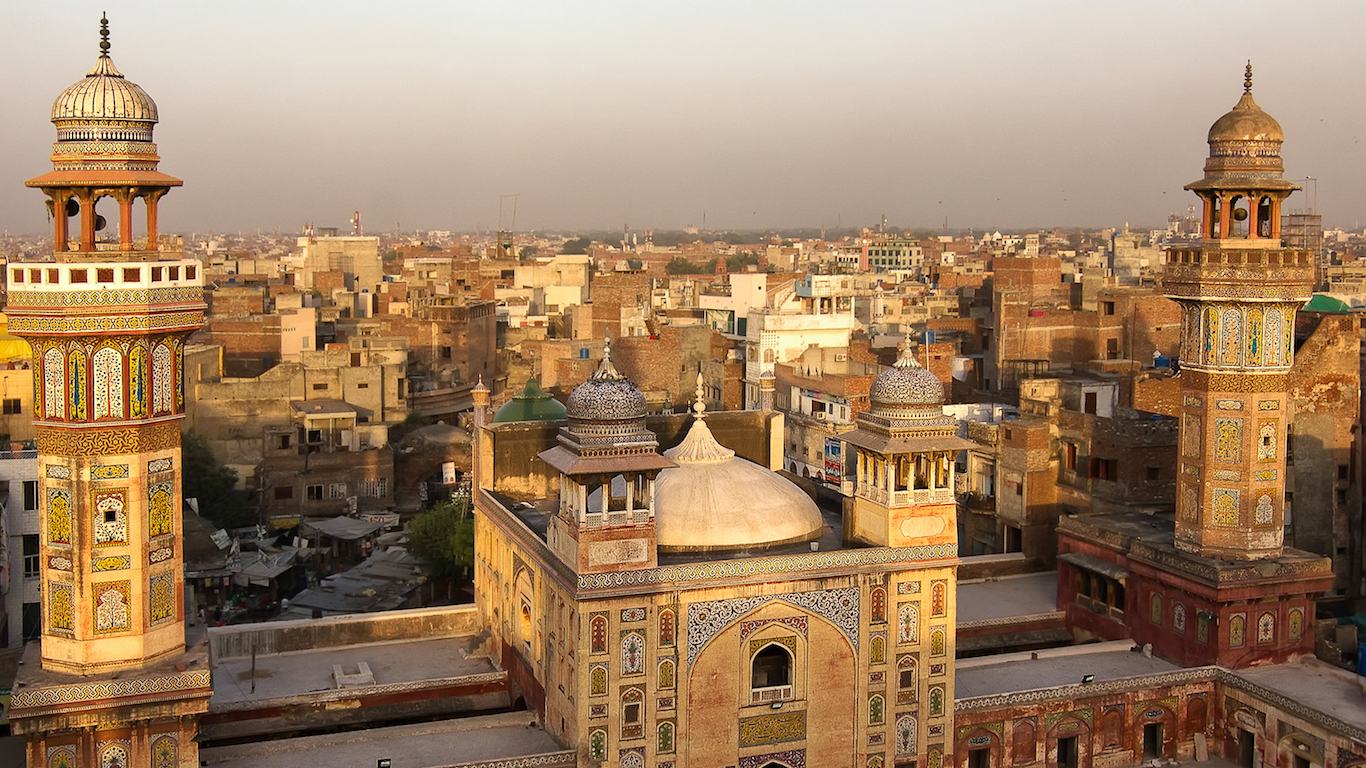
4. Pakistan
> Disapproval rating: 71.0%
> GDP per capita: $4,906
> Unemployment rate: 5.9%
> Life expectancy: 66.2 years
Pakistan, a nuclear-armed, long-time U.S. ally, reports nearly the worst U.S. disapproval rating in the world. The Pakistani government relies on U.S. military aid to fight the Taliban in the northwest, another insurgency in the west along its border with Iran, and also to maintain its heavily armed eastern border with India. Despite the close ties, however, the U.S. has relied recently on drone strikes to target terrorists in the area, which according to some is at the expense of U.S.-Pakistan relations. Civilian casualties, which based on Pentagon reports are not uncommon during airstrikes, have been reported in Pakistan.

3. Lebanon
> Disapproval rating: 72.0%
> GDP per capita: $18,277
> Unemployment rate: N/A
> Life expectancy: 79.4 years
Nearly three in four Lebanese citizens disapprove of U.S. leadership, among the largest share of any country. Lebanon’s disapproval of the United States is likely grounded in America’s support for Israel, Lebanon’s neighbor and enemy to the south. Violent conflicts between the two countries have been relatively common for roughly four decades. The U.S. has been accused of holding a double standard in its foreign policy towards its two allies Lebanon and Israel. In 2006, for example, while the United States provided humanitarian aid to Lebanon, Israel attacked the country with American-made bombs. That year, Secretary of State Condoleezza Rice refused to broker a ceasefire that might have ended the 34-day war between the two countries. For many Lebanese, U.S. support of Israel is likely difficult to reconcile with the Lebanese-U.S. alliance.
[in-text-ad]

2. Palestinian territories
> Disapproval rating: 79.0%
> GDP per capita: N/A
> Unemployment rate: N/A
> Life expectancy: 72.9 years
Nearly four in five residents of the Palestinian territories — the West Bank and Gaza Strip — disapprove of U.S. leadership, the highest proportion of any country other than Russia. Hatred of America within the Palestinian territories is likely the result of the close military alliance between the U.S. and Israel. Since 1967, when Israel occupied the West Bank and Gaza Strip in the Six-Day War, Israel has maintained control of these territories. Israel is the largest recipient of U.S. military aid in the world. While the United States provides humanitarian aid to the region, Israel receives an estimated $3.1 billion of American military assistance annually. Many in the region do not approve of U.S. foreign policy such as the United States not recognizing the West Bank and Gaza as comprising the State of Palestine.

1. Russia
> Disapproval rating: 89.0%
> GDP per capita: $25,965
> Unemployment rate: 5.6%
> Life expectancy: 70.4 years
No country disapproves more strongly of U.S. leadership than Russia, where 89% of people have a negative perception of the Obama administration. The 1% U.S. approval rating is also at its lowest point in decades, corroborating claims by some that U.S.-Russia relations are the worst since the Cold War. Based on the next round of surveys conducted so far this year, the approval rating may have improved slightly to 2%, still the lowest.
Anti-American sentiments have long been common in Russia. Recent upticks are likely due largely to Russia’s annexation of Crimea in 2014, a move that the United States did not recognize or approve. In 2011, Russian President Vladimir Putin claimed then Secretary of State Hillary Clinton was responsible for protests in Moscow contesting his rule. Most recently, in another sign of hostilities between the two superpowers, U.S. Vice President Joe Biden publicly threatened Russia with cyber attacks.
Let’s face it: If your money is just sitting in a checking account, you’re losing value every single day. With most checking accounts offering little to no interest, the cash you worked so hard to save is gradually being eroded by inflation.
However, by moving that money into a high-yield savings account, you can put your cash to work, growing steadily with little to no effort on your part. In just a few clicks, you can set up a high-yield savings account and start earning interest immediately.
There are plenty of reputable banks and online platforms that offer competitive rates, and many of them come with zero fees and no minimum balance requirements. Click here to see if you’re earning the best possible rate on your money!
Thank you for reading! Have some feedback for us?
Contact the 24/7 Wall St. editorial team.